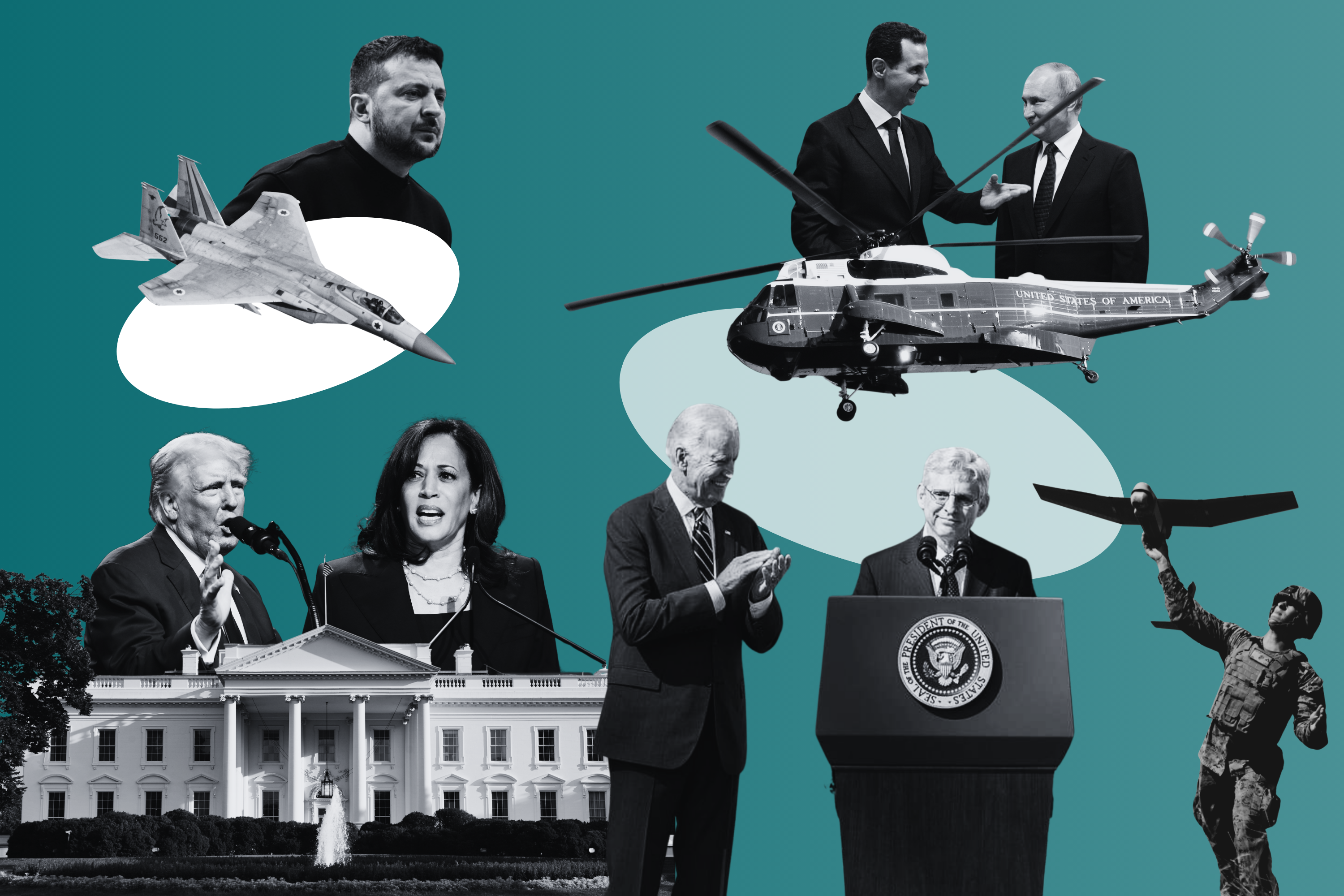The Week That Was: All of Lawfare in One Post
Ben announced Wells’s forthcoming departure from Lawfare and invites you to come work for the team, especially if you are "someone who everyone enjoys and who utterly lacks Washington pomposity."
Published by The Lawfare Institute
in Cooperation With

Ben announced Wells’s forthcoming departure from Lawfare and invites you to come work for the team, especially if you are "someone who everyone enjoys and who utterly lacks Washington pomposity."
As Russia commenced airstrike operations in Syria, Bobby questioned whether Article II might provide domestic legal authorization for the use of force to defend U.S.-backed Syrian rebels from Russian airstrikes after a senior Obama Administration official told Defense One that "if Syrian government forces attack the Syrian fighters we have trained and equipped while they were engaging ISIL, the President would have the authority under Article II of the Constitution to defend those fighters.”
Also, Quinta pointed out that a legislative body has finally approved an AUMF for Syria: the upper body of Russia’s parliament authorized the use of military force in Syria in a unanimous vote of 162 to 0.
Ben shared this week’s Rational Security podcast in which Tamara and Shane discussed attacks on U.S.-backed rebels in Syria and the resulting political changes in the Middle East. In addition to reflecting on this week’s most recent developments in Syria and the “terrible” U.S. optics, they consider the possibility of escalation between the United States and Russia.
Aaron Zelin posted this week’s Jihadology Podcast. He talked Al Qaeda in the Arabian Peninsula (AQAP) with AEI’s Katherine Zimmerman, discussing how the group has been affected by the conflict in Yemen, the rise of the Houthis, the U.S. drone program, and the rise of the Islamic State among other dynamics in the region.
Wondering what exactly a Houti is? Cody shared this week’s Lawfare Podcast. The podcast features all things Yemen with Yemen expert Gregory Johnson, who explains—for those who are confused on the subject—what a Houthi is, Yemeni power politics, the local issues responsible for the conflict, and the possibility of the conflict’s escalation.
Jillian Schwedler asked if the U.S. drone program in Yemen is working and by what metric we can best measure its success. Choosing to focus on the “longer-term impact of the drone strikes on the legitimacy and attractiveness of al-Qaida’s message in Yemen and its ability to recruit among Yemenis themselves,” she suggests that it is “crucial to see the bigger picture” as anti-American sentiment grows and bolster’s AQAP’s recruitment pitch.
Quinta Jurecic explored what it means that Apple blocked the app Metadata+, an online drone strike tracker. She asked why Apple would categorize an app that alerts users to drone strikes as “excessively crude or objectionable” and suggested that the app might have become “too intimate” for bringing users to the “perverse closeness engendered by targeted killing—particularly the kind of targeted killing enabled by drone technology.”
Kemal Kirişci and Sinan Ekim asked whether there is an impending civil war facing Turkey as violence escalates between Turkish security personnel and PKK forces. They pointed to evidence of electoral shifts within Turkish politics and rising levels of instability across the country.
Cody linked to the White House’s statement on H.R. 3457, “The Justice for Victims of Iranian Terrorism Act.” The bill, aimed at mandating payment of Iranian funds to victims of terrorism, would prevent President Obama “from providing sanctions relief to Iran as outlined in the JCPOA until after Tehran paid ‘each judgment against Iran’ for its role in financing terrorism.”
Bobby put U.S. operations in Kunduz into their legal and policy context. In light of this week’s events in Afghanistan, which caused U.S. troops to return fire on Taliban insurgents, he considered why the military emphasized the self-defense quality of their use of force. To answer this, Bobby looked to policy constraints imposed by the Obama administration that were reflected in the evolving rules of engagement governing U.S. use of force in Afghanistan and asked whether our interpretation of the rules-of-engagement differs from the reality on the ground.
Matthew Weybrecht discussed U.S. military due process in Afghanistan in light of the scandal concerning orders to look the other way when confronting Afghan security personnel’s violations of boys, asking whether the United States should “permit two of its soldiers to administer non-judicial physical punishment against an Afghan.” He concluded that “the [U.S.] Army seems to be saying that its soldiers must also provide due process to Afghans accused of rape, even if that must be done in Afghan courts with dubious prospects for justice.”
Meanwhile, Chinese President Xi Jinping’s visit to the United States continued to make waves at Lawfare. In the new installment of Water Wars, Zack Bluestone took a look at Xi’s address to the U.N. General Assembly. Though Xi did not mention directly Chinese activities in the South China Sea, he alluded to the inviolability of each nation’s “sovereignty and territorial integrity” and suggested that “China will never pursue hegemony, expansion or spheres of influence.” For his part, President Obama encouraged China and other countries involved in maritime disputes to resolve their differences peacefully while maintaining "the basic principles of freedom of navigation and the free flow of commerce."
Also touching on regional tensions, Cody considered the growing strategic rivalry between China and India and suggested that all of China’s recent actions, including its buildup in the South China Sea and its continued espionage endeavors, were part of a “New Great Game for influence in the Indo-Pacific.” Cody linked to the piece he authored with Dr. Rani Mullen in Foreign Affairs.
With “2015 as a consequential year in China’s evolving global strategy,” Bruce Jones discussed the challenges facing Xi and the direction in which the Chinese leadership is heading.
Herb Lin considered at Chinese President Xi Jinping’s remarks on the China’s stance on cybersecurity. He highlights two definitive statements that Xi made in his visit to the United States last week, both condemning the theft of intellectual property and affirming China’s commitment to cybersecurity, and asks whether or not the statements have also been broadcast in China.
Jack scrutinized the agreement between Xi and Obama “that neither country's government will conduct or knowingly support cyber-enabled theft of intellectual property, including trade secrets or other confidential business information, with the intent of providing competitive advantages to companies or commercial sectors” and considered the ambiguities inherent in the pledge. Ben also weighed in on the agreement and offered a suggestion for how Congress could play a constructive role in making sure the agreement was honored, proposing that congressional committees ask “officials in open hearings whether or not they have seen signs of changed Chinese behavior in the period leading up to and following this agreement.”
Stewart Baker posted the 82nd episode of the Steptoe Cyberlaw Podcast. In this episode, Stewart talks to cyberexpert Jim Lewis about the implications of the Obama-Xi summit on the future of cyber espionage. He also considers a smorgasbord of cyberlaw updates around the world:
Considering the effect of cyberspace on military strategy and operations, Frank Cilluffo and Joseph Clark highlighted differing perspectives on whether or not cyber changes conflict. Some argue that cyber transforms how war is fought and strategized while others argue that cyber capabilities simply reinforce the status quo.
Ben expressed surprise that the D.C. Circuit granted en banc review in the latest round of Al Bahlul litigation which, as suggested by Just Security’s Steve Vladeck, will only further prolong the Guantánamo military commissions.
David Kris offered some preliminary thoughts on cross-border data requests and how the international community can reconcile diverging legal requirements to promote trade, privacy, and security.
Nicholas Weaver addressed the bad blood between the NSA and Silicon Valley. In light of NSA’s attacks on not only Silicon Valley giants but the business models on which they operate, he addressed Silicon Valley’s fight back against the data collecting behemoth. He suggested that “Silicon Valley’s greatest asset is trust, and the NSA attacked that.”
Alex Loomis asked about the future for the safe harbor framework, the arrangement that allows U.S. companies to work within E.U. data privacy laws. Following the release of a non-binding opinion from the Court of Justice for the European Union’s Advocate General which called into question the framework’s future, he traced the history of the framework and asked what implications the opinion could have on U.S.-E.U. data privacy.
Michael Knapp provided a primer on United States v. Ganias, which held that retention of “ lawfully obtained [mirror image] data for two-and-a-half years and its subsequent use in a separate criminal proceeding violated the Fourth Amendment,” a decision which could impact other data retention by government agencies. He then recapped Second Circuit oral arguments.
Ben welcomed Edward Snowden to Twitter with some questions and invited Snowden to address his critics using the platform. He suggested that other Lawfare readers join the questioning with #LetsAskSnowden. Ben also wished Just Security a happy second birthday and linked to their anniversary debate on going dark with Center on National Security and the Law and the Center on Privacy and Technology at Georgetown Law.
Steven Pifer discussed the “unending saga of Ukrainian reform” and the political divisions facing the country as indicated by September’s Yalta European Strategy (YES) conference. Though the government of President Petro Poroshenko and Prime Minister Arseniy Yatseniuk has made progress in certain areas, issues ranging from the status of Ukraine’s relationship with NATO and Russia to the internal political clashes continue to loom large.
Finally, Aurel Sari reflected on legal aspects of hybrid warfare following a workshop discussing the matter at the Strategy and Security Institute of the University of Exeter. He suggested that hybrid warfare does pose challenges to the legal framework surrounding it as it operates under our legal criteria dependent “reaction threshold” and calls into question our legal conception of warfare among other reasons.
And that was the week that was.





